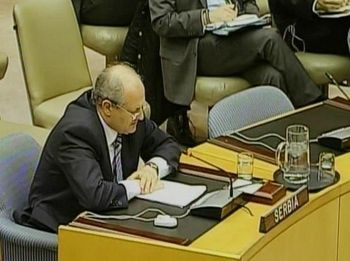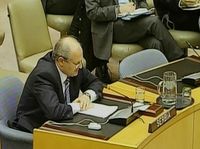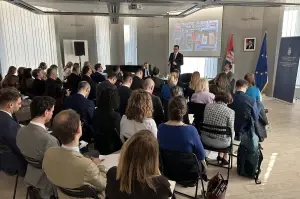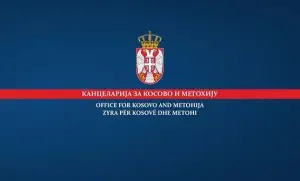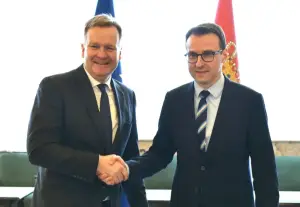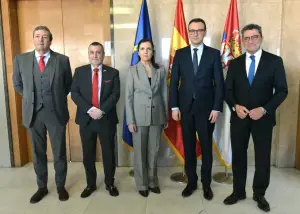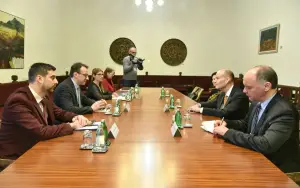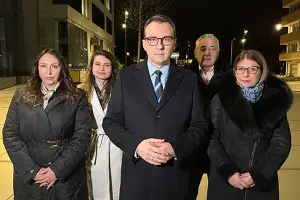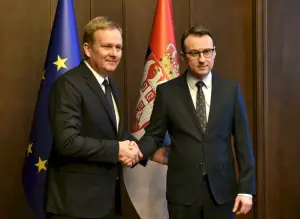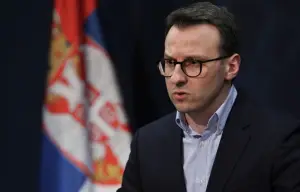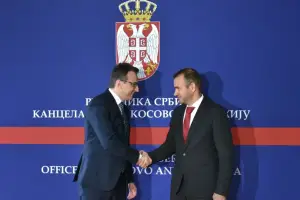Q:
A:
Dialogue with Pristina only way to overcome crisis in Kosovo-Metohija
Belgrade/New York,
28 November 2012
Minister of Foreign Affairs Ivan Mrkic said that Serbia is committed to the full implementation of all the agreements reached so far in dialogue with Pristina and is open to discuss all issues, except for the abolition of Serbian institutions in Kosovo-Metohija.
In his speech at a session of the UN Security Council, at which a regular quarterly report on Kosovo-Metohija by UN Secretary General Ban Ki-moon was presented, Mrkic said that the UN’s role in stabilising the situation in the region is indispensable and that in this respect the mandate of UNMIK must remain unchanged.
We would like to see more effective collaboration of UNMIK, KFOR and EULEX. Both UNMIK and EULEX should remain active in the field and act in accordance with their respective mandates, in a status neutral manner, under the auspices of the UN, Mrkic pointed out.
He added that the role of the EULEX should also not be changed and that its executive role remains crucial, especially given the implementation of the agreements reached in dialogue between Belgrade and Pristina, with the emphasis on the agreement on joint border management.
The Republic of Serbia will insist on the implementation of the agreed solutions on joint border management through presence and the executive role of the EULEX at the administrative borderline, the Foreign Minister said.
Mrkic underlined that Serbia considers dialogue with Pristina the only way to overcome the current crisis and find sustainable solutions to the problems with which inhabitants of Kosovo-Metohija are faced every day.
The Foreign Minister recalled that the new Serbian government has recently taken part in the continuation of dialogue with the desire to achieve concrete progress, and that Prime Minister of Serbia Ivica Dacic and representative of provisional institutions of self-government in Pristina Hashim Thaci spoke in Brussels on 7 November about a wide range of topics.
Serbia wants to progress towards a European future and is fully committed to the process which should result in a lasting peace between Serbs and Albanians, Mrkic stressed.
Mrkic noted that despite the long-term international presence in Kosovo-Metohija there is no significant improvement on the ground.
The lives and property of Serbs and other non-Albanians are still threatened. There are no basic security conditions or the freedom of movement and employment, and Serbian refugees and displaced persons have not been provided safe return to their homes in Kosovo-Metohija, Mrkic said.
He added that infrastructure has not been renewed, while violence by Albanian separatists against Serbs and their cultural and religious sites continues, and human rights in Kosovo-Metohija, especially of Serbs and other non-Albanians, are still endangered.
The Foreign Minister also said that a decline in the number of cases of inter-ethnic violence is not the result of improved inter-ethnic relations, but a consequence of the growing isolation of the Serbian population, caused by their retreat into enclaves and isolated villages.
According to information available to us, in the period from July to October this year, more than 70 attacks could be described as ethnically motivated.
The result is that fewer and fewer Serbs live in Kosovo-Metohija, Mrkic said.
He added that the instability was additionally fuelled by several arrests of Serbs without any explanation, and in the legal sense, because of controversial warrants for their arrest.
A systematic destruction of homes abandoned by Serbs and other non-Albanians continues, Mrkic said, indicating that the apparent goal is to force the remaining Serbs to leave and to prevent the return of refugees.
In this regard, the Foreign Minister added that the return of internally displaced persons from Kosovo-Metohija is slow process, characterised by a low level of sustainability, noting that, according to the latest figures for this year, only 285 Serbs have returned to Kosovo-Metohija, which confirms the constant decline in the number of returnees.
Mrkic said that the way in which the Kosovo Privatisation Agency (KTA) privatises companies in Kosovo is alarming, particularly since January this year.
Especially worrying is the privatisation of public and social enterprises in Serbian communities. The consequence of the sale of these companies to Albanians is an additional factor forcing Serbs to leave, Mrkic pointed out.
He added that a special problem is the constant prohibition of visits of Serbian officials and their free movement in Kosovo-Metohija, despite the fact that they properly inform EULEX about that, adding that humanitarian aid is also denied entry into Kosovo-Metohija.
Referring to the recent acquittal decision of the Hague tribunal for Croatian generals Ante Gotovina and Mladen Markac, Mrkic pointed to its negative impact on the process of reconciliation in the region, pointing out that this decision amazed entire Serbia and many legal experts around the world.
We would like to see more effective collaboration of UNMIK, KFOR and EULEX. Both UNMIK and EULEX should remain active in the field and act in accordance with their respective mandates, in a status neutral manner, under the auspices of the UN, Mrkic pointed out.
He added that the role of the EULEX should also not be changed and that its executive role remains crucial, especially given the implementation of the agreements reached in dialogue between Belgrade and Pristina, with the emphasis on the agreement on joint border management.
The Republic of Serbia will insist on the implementation of the agreed solutions on joint border management through presence and the executive role of the EULEX at the administrative borderline, the Foreign Minister said.
Mrkic underlined that Serbia considers dialogue with Pristina the only way to overcome the current crisis and find sustainable solutions to the problems with which inhabitants of Kosovo-Metohija are faced every day.
The Foreign Minister recalled that the new Serbian government has recently taken part in the continuation of dialogue with the desire to achieve concrete progress, and that Prime Minister of Serbia Ivica Dacic and representative of provisional institutions of self-government in Pristina Hashim Thaci spoke in Brussels on 7 November about a wide range of topics.
Serbia wants to progress towards a European future and is fully committed to the process which should result in a lasting peace between Serbs and Albanians, Mrkic stressed.
Mrkic noted that despite the long-term international presence in Kosovo-Metohija there is no significant improvement on the ground.
The lives and property of Serbs and other non-Albanians are still threatened. There are no basic security conditions or the freedom of movement and employment, and Serbian refugees and displaced persons have not been provided safe return to their homes in Kosovo-Metohija, Mrkic said.
He added that infrastructure has not been renewed, while violence by Albanian separatists against Serbs and their cultural and religious sites continues, and human rights in Kosovo-Metohija, especially of Serbs and other non-Albanians, are still endangered.
The Foreign Minister also said that a decline in the number of cases of inter-ethnic violence is not the result of improved inter-ethnic relations, but a consequence of the growing isolation of the Serbian population, caused by their retreat into enclaves and isolated villages.
According to information available to us, in the period from July to October this year, more than 70 attacks could be described as ethnically motivated.
The result is that fewer and fewer Serbs live in Kosovo-Metohija, Mrkic said.
He added that the instability was additionally fuelled by several arrests of Serbs without any explanation, and in the legal sense, because of controversial warrants for their arrest.
A systematic destruction of homes abandoned by Serbs and other non-Albanians continues, Mrkic said, indicating that the apparent goal is to force the remaining Serbs to leave and to prevent the return of refugees.
In this regard, the Foreign Minister added that the return of internally displaced persons from Kosovo-Metohija is slow process, characterised by a low level of sustainability, noting that, according to the latest figures for this year, only 285 Serbs have returned to Kosovo-Metohija, which confirms the constant decline in the number of returnees.
Mrkic said that the way in which the Kosovo Privatisation Agency (KTA) privatises companies in Kosovo is alarming, particularly since January this year.
Especially worrying is the privatisation of public and social enterprises in Serbian communities. The consequence of the sale of these companies to Albanians is an additional factor forcing Serbs to leave, Mrkic pointed out.
He added that a special problem is the constant prohibition of visits of Serbian officials and their free movement in Kosovo-Metohija, despite the fact that they properly inform EULEX about that, adding that humanitarian aid is also denied entry into Kosovo-Metohija.
Referring to the recent acquittal decision of the Hague tribunal for Croatian generals Ante Gotovina and Mladen Markac, Mrkic pointed to its negative impact on the process of reconciliation in the region, pointing out that this decision amazed entire Serbia and many legal experts around the world.

